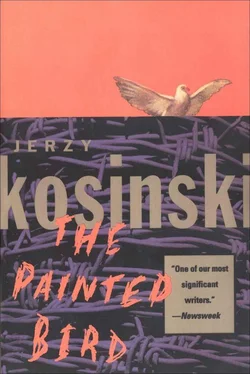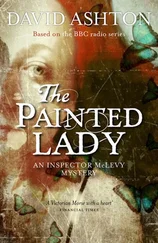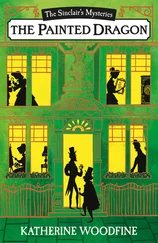Jerzy Kosiński - The Painted Bird
Здесь есть возможность читать онлайн «Jerzy Kosiński - The Painted Bird» весь текст электронной книги совершенно бесплатно (целиком полную версию без сокращений). В некоторых случаях можно слушать аудио, скачать через торрент в формате fb2 и присутствует краткое содержание. Год выпуска: 1965, ISBN: 1965, Жанр: Детская проза, на английском языке. Описание произведения, (предисловие) а так же отзывы посетителей доступны на портале библиотеки ЛибКат.
- Название:The Painted Bird
- Автор:
- Жанр:
- Год:1965
- ISBN:978-0-8021-9575-3
- Рейтинг книги:4 / 5. Голосов: 1
-
Избранное:Добавить в избранное
- Отзывы:
-
Ваша оценка:
- 80
- 1
- 2
- 3
- 4
- 5
The Painted Bird: краткое содержание, описание и аннотация
Предлагаем к чтению аннотацию, описание, краткое содержание или предисловие (зависит от того, что написал сам автор книги «The Painted Bird»). Если вы не нашли необходимую информацию о книге — напишите в комментариях, мы постараемся отыскать её.
The Painted Bird — читать онлайн бесплатно полную книгу (весь текст) целиком
Ниже представлен текст книги, разбитый по страницам. Система сохранения места последней прочитанной страницы, позволяет с удобством читать онлайн бесплатно книгу «The Painted Bird», без необходимости каждый раз заново искать на чём Вы остановились. Поставьте закладку, и сможете в любой момент перейти на страницу, на которой закончили чтение.
Интервал:
Закладка:
As soon as I found myself in the shade of the trees I started rolling over in the cool, moist moss, rubbing myself with cold leaves. With pieces of bark I scraped off the remaining muck. I rubbed sand in my hair and then rolled in the grass and vomited again.
Suddenly I realized that something had happened to my voice. I tried to cry out, but my tongue flapped helplessly in my open mouth. I had no voice. I was terrified and, covered with cold sweat, I refused to believe that this was possible and tried to convince myself that my voice would come back. I waited a few moments and tried again. Nothing happened. The silence of the forest was broken only by the buzzing of the flies around me.
I sat down. The last cry that I had uttered under the falling missal still echoed in my ears. Was it the last cry I would ever utter? Was my voice escaping with it like a solitary duck call straying over a huge pond? Where was it now? I could envision my voice flying alone under the high-arched, vaulting ribs of the church roof. I saw it knocking against the cold walls, the holy pictures, against the thick panes of colored glass in the windows, which the sun’s rays could scarcely penetrate. I followed its aimless wanderings through the dark aisles, where it wafted from the altar to the pulpit, from the pulpit to the balcony, from the balcony to the altar again, driven by the multichorded sound of the organ and the groundswell of the singing crowd.
All the mutes I had ever seen paraded by under my lids. There were not very many of them and their absence of speech made them seem very much alike. The absurd twitching of their faces tried to substitute for the missing sound of their voices, while the frantic movement of their limbs took the place of their un-forthcoming words. Other people always looked at them with suspicion; they appeared like strange creatures, shaking, grimacing, dribbling heavily down their chins.
There must have been some cause for the loss of my speech. Some greater force, with which I had not yet managed to communicate, commanded my destiny. I began to doubt that it could be God or one of His saints. With my credit secured by vast numbers of prayers, my days of indulgence must have been innumerable; God had no reason to inflict such terrible punishment on me. I had probably incurred the wrath of some other forces, which spread their tentacles over those God had abandoned for some reason or other.
I walked farther and farther from the church, plunging into the thickening forest. From the black earth that the sun never reached stuck out the trunks of trees cut down long ago. These stumps were now cripples unable to clothe their stunted mutilated bodies. They stood single and alone. Hunched and squat, they lacked the force to reach up toward the light and air. No power could change their condition; their sap would never rise up into limbs or foliage. Large knotholes low on their boles were like dead eyes staring eternally with unseeing pupils at the waving crests of their living brethren. They would never be torn or tossed by the winds but would rot slowly, the broken victims of the dampness and decay of the forest floor.
12
When the village boys who were lying in wait for me in the forest caught me at last, I expected something terrible to happen to me. Instead, I was taken to the head of the village. He made certain that I had no sores or ulcers on my body and that I could make the sign of the cross. Then, after several unsuccessful attempts to place me with other peasants, he handed me over to a farmer called Makar.
Makar lived with his son and daughter on a farmstead set apart from the rest of the settlement. Apparently his wife had died long ago. He himself was not well known in the village. He had arrived only a few years before and was treated as a stranger. But rumors circulated that he avoided other people because he sinned both with the boy he called his son and with the girl he called his daughter. Makar was short and stocky, and had a thick neck. He suspected I only pretended to be mute to avoid betraying my Gypsy speech. Sometimes at night he would rush into the tiny attic in which I slept and try to force a scream of fear from me. I would awake shaking and open my mouth like a baby chick wanting to be fed, but no sound came out. He watched me intently and seemed disappointed. After repeating the test from time to time, he eventually gave up.
His son Anton was twenty years old. He was a redhead with pale eyes and no eyelashes. He was shunned in the village as much as his father. When someone spoke to him he would glance indifferently at the speaker and then turn silently away. They called him the Quail, because he was like that bird in his habit of speaking only to himself and never answering other voices.
There was also the daughter Ewka, a year younger than the Quail. She was tall and blond and thin with breasts like unripe pears and hips that allowed her to squeeze easily between the staves of a fence. Ewka never visited the village either. When Makar went with Quail to sell rabbits and rabbit skins in the neighboring villages, she remained alone. She was visited occasionally by Anulka, the local purveyor of cures.
Ewka was not liked by the villagers. The peasants said she had a ram in her eyes. They laughed at the goiter which was beginning to disfigure her neck, and at her hoarse voice. They said that the cows lost their milk in her presence, and that was why Makar kept only rabbits and goats.
I often heard peasants mutter that Makar’s strange family should be turned out of the village and his house burned down. But Makar did not listen to such threats. He always carried a long knife in his sleeve, and he could throw it with such perfect aim that he once pinned a cockroach to a wall at five paces. And Quail held a hand grenade in his pocket. He had found it on a dead partisan, and he always threatened the person and family of anyone who bothered him or his father or sister.
Makar kept a trained wolfhound, which he called Ditko, in the backyard. There were the rabbit cages arranged in rows in the outbuildings surrounding the yard. Only wire netting separated the cages from one another. The rabbits sniffed and communicated while Makar could watch them all at one glance.
Makar was a rabbit expert. In his cages he had many splendid specimens too costly for even the wealthiest farmers. At the farm he had four she-goats and a male goat. The Quail looked after them, milked them, took them out to pasture, and sometimes locked himself up with them in the stable. When Makar came home after a successful sale, both he and his son would get drunk and go to the goats’ quarters. Ewka used to hint maliciously that they were enjoying themselves in there. At such times Ditko was tied close to the door to prevent anyone approaching.
Ewka did not like her brother and father. Sometimes she would not leave the house for days, fearing that Makar and Quail would force her to spend the whole afternoon with them in the goats’ stable.
Ewka liked to have me around when she was cooking. I helped to peel the vegetables, brought firewood, and carried out the ashes.
Sometimes she asked me to sit close to her legs and kiss them. I used to cling to her slim calves and start kissing them very slowly from the ankles, first with a light touch of the lips and gentle strokes of the hand along the taut muscles, kissing the soft hollow under her knee, up on the smooth white thighs. I gradually lifted her skirt. I was urged on by light taps on my back, and I hastened upward, kissing and half biting the tender flesh. When I reached the warm mound, Ewka’s body began to shake spasmodically. She ran her fingers wildly through my hair, caressed my neck and pinched my ears, panting faster and faster. Then she pressed my face hard against herself and after a moment of trance fell back on the bench, all spent.
Читать дальшеИнтервал:
Закладка:
Похожие книги на «The Painted Bird»
Представляем Вашему вниманию похожие книги на «The Painted Bird» списком для выбора. Мы отобрали схожую по названию и смыслу литературу в надежде предоставить читателям больше вариантов отыскать новые, интересные, ещё непрочитанные произведения.
Обсуждение, отзывы о книге «The Painted Bird» и просто собственные мнения читателей. Оставьте ваши комментарии, напишите, что Вы думаете о произведении, его смысле или главных героях. Укажите что конкретно понравилось, а что нет, и почему Вы так считаете.












